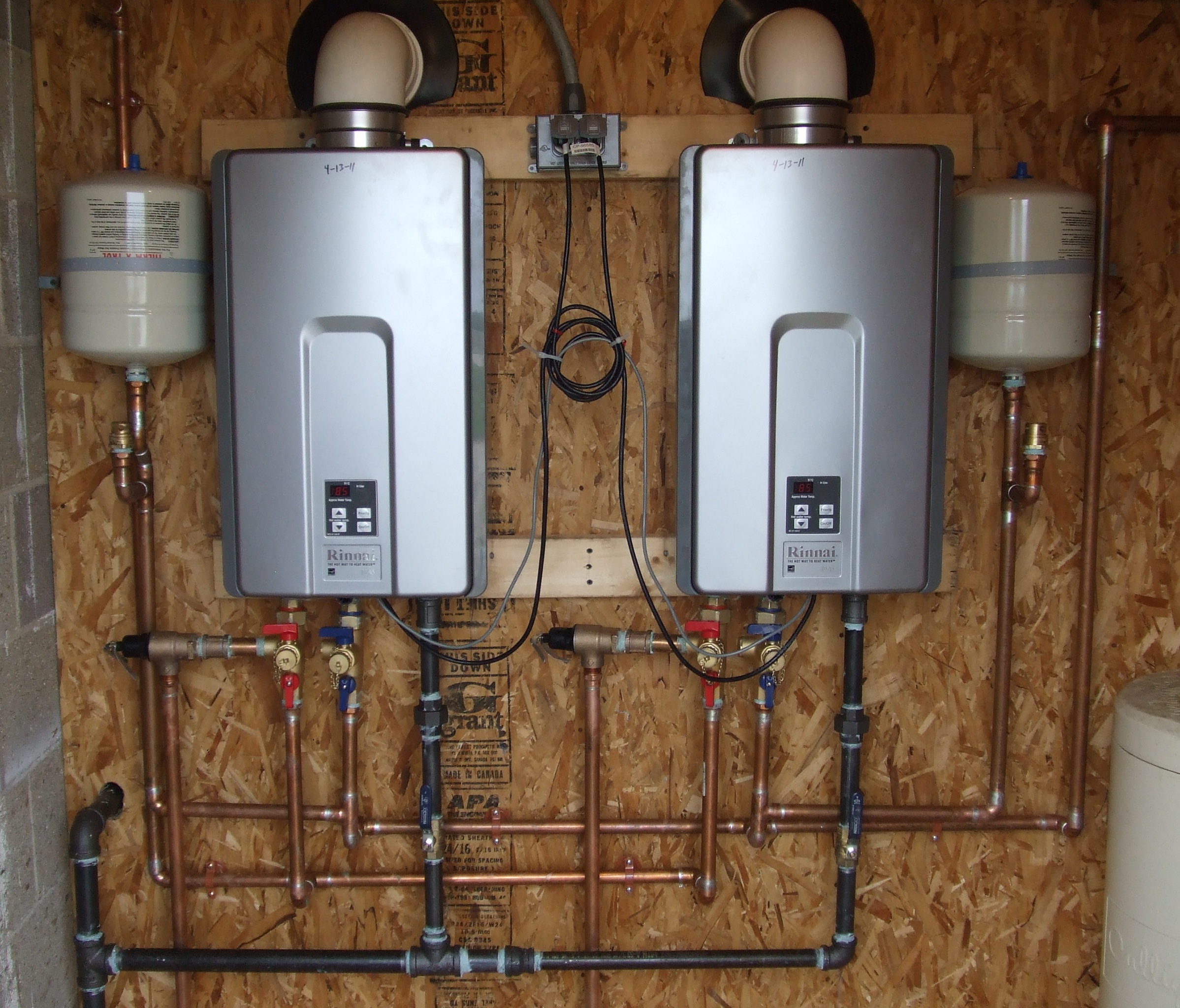Heat pump water heaters (HPWHs) are an energy-efficient option for heating water in residential and commercial settings. They work by transferring heat from the surrounding air into the water, using electricity to move heat rather than generate it directly.
This method can be two to three times more energy-efficient than conventional electric water heaters, making HPWHs an attractive option for those looking to reduce energy consumption and utility bills. This comprehensive guide will walk you through everything you need to know about shopping for a heat pump water heater, including how they work, the benefits they offer, key features to consider, and reviews of the best models.
Understanding Heat Pump Water Heaters
How Heat Pump Water Heaters Work
Heat pump water heaters use electricity to move heat from one place to another instead of generating heat directly. They consist of a compressor, a fan, and a heat exchanger. The fan draws in air from the surrounding environment, and the heat exchanger extracts heat from this air. The compressor then increases the temperature of the extracted heat, which is transferred to the water stored in the tank. By leveraging ambient air, HPWHs can provide hot water efficiently and cost-effectively.
Types of Heat Pump Water Heaters
There are two main types of heat pump water heaters: integrated units and add-on units.
Integrated Units
Integrated units combine a heat pump and a water storage tank into a single system. These units are designed to replace traditional water heaters and are relatively easy to install in new constructions or as replacements for existing systems.
Add-On Units
Add-on units, also known as retrofit units, are designed to be added to existing water heating systems. They consist of a heat pump that works in conjunction with an existing water heater, improving its efficiency. These units are ideal for homeowners who want to enhance the performance of their current water heating setup without replacing the entire system.
Benefits of Heat Pump Water Heaters
Energy Efficiency
Heat pump water heaters are significantly more energy-efficient than conventional electric water heaters. By transferring heat rather than generating it, HPWHs can reduce energy consumption by up to 60%, leading to substantial savings on utility bills.
Environmental Impact
By consuming less energy, heat pump water heaters contribute to lower greenhouse gas emissions. This makes them a more environmentally friendly option for heating water, aligning with sustainability goals and reducing your carbon footprint.
Cost Savings
Although the initial cost of a heat pump water heater can be higher than traditional water heaters, the long-term savings on energy bills can offset the upfront investment. Additionally, many regions offer rebates and incentives for installing energy-efficient appliances, further reducing the overall cost.
Longevity and Reliability
Heat pump water heaters typically have a longer lifespan than conventional water heaters. With proper maintenance, they can last 10-15 years or more, providing reliable hot water for your home or business.
Key Features to Consider
Capacity
The capacity of a heat pump water heater refers to the amount of hot water it can store. This is usually measured in gallons. Choosing the right capacity depends on your household size and hot water usage. For instance, a family of four might require a unit with a capacity of 50-80 gallons, while smaller households can opt for units with a lower capacity.
Efficiency Ratings
Efficiency ratings, such as the Energy Factor (EF) or Uniform Energy Factor (UEF), indicate the energy efficiency of a water heater. Higher ratings signify better efficiency. Look for units with high EF or UEF ratings to ensure maximum energy savings.
Operating Modes
Many heat pump water heaters come with different operating modes to optimize performance based on your needs. Common modes include:
- Efficiency Mode: Prioritizes energy savings by using the heat pump exclusively.
- Hybrid Mode: Uses both the heat pump and conventional electric heating elements to provide a balance between efficiency and recovery time.
- Electric Mode: Uses only the electric heating elements, bypassing the heat pump.
- Vacation Mode: Reduces energy consumption when you’re away from home for extended periods.
Noise Level
Heat pump water heaters can generate noise due to the operation of the fan and compressor. Check the noise level rating, usually measured in decibels (dB), to ensure the unit won’t be disruptive, especially if installed near living areas.
Installation Requirements
Consider the space and location where you plan to install the heat pump water heater. These units require adequate ventilation to operate efficiently. They are typically installed in basements, garages, or utility rooms where there is sufficient airflow.
Warranty
A good warranty can provide peace of mind and protect your investment. Look for units with comprehensive warranties that cover both the heat pump and the water tank. Warranty periods can range from 5 to 10 years or more, depending on the manufacturer.
Top Heat Pump Water Heaters on the Market
Rheem Performance Platinum Hybrid Heat Pump Water Heater
The Rheem Performance Platinum Hybrid Heat Pump Water Heater is known for its high efficiency and excellent performance. With a UEF rating of 3.70, it offers significant energy savings. This unit features a 50-gallon capacity, making it suitable for medium to large households. It comes with multiple operating modes, including a vacation mode, and has a built-in Wi-Fi feature for remote control and monitoring.
AO Smith Signature Premier Hybrid Electric Heat Pump Water Heater
AO Smith’s Signature Premier Hybrid Electric Heat Pump Water Heater boasts a UEF rating of 3.45 and a 50-gallon capacity. It features a durable stainless steel construction and multiple operating modes. The unit is designed for easy installation and maintenance, with user-friendly controls and a digital display.
GE GeoSpring Hybrid Electric Water Heater
The GE GeoSpring Hybrid Electric Water Heater is a popular choice due to its efficiency and reliability. It has a UEF rating of 3.25 and a 50-gallon capacity. This unit includes several operating modes and is equipped with advanced electronic controls for precise temperature management. The GeoSpring also features a vacation mode to save energy when not in use.
Stiebel Eltron Accelera 300 Heat Pump Water Heater
The Stiebel Eltron Accelera 300 Heat Pump Water Heater is known for its high performance and energy efficiency. With a UEF rating of 3.39 and an 80-gallon capacity, it is ideal for larger households. This unit is designed for quiet operation and includes a high-quality stainless steel tank for durability.
Bradford White AeroTherm Series Heat Pump Water Heater
The Bradford White AeroTherm Series Heat Pump Water Heater offers a UEF rating of 3.39 and comes in various capacities, including 50 and 80 gallons. It features a durable design with multiple operating modes and a user-friendly interface. The AeroTherm series is known for its reliability and long lifespan.
Comparison Table
| Product | Capacity (Gallons) | UEF Rating | Operating Modes | Warranty | Price Range |
|---|---|---|---|---|---|
| Rheem Performance Platinum Hybrid | 50 | 3.70 | Efficiency, Hybrid, Electric, Vacation | 10 years | $1,200-$1,500 |
| AO Smith Signature Premier Hybrid | 50 | 3.45 | Efficiency, Hybrid, Electric, Vacation | 10 years | $1,200-$1,400 |
| GE GeoSpring Hybrid Electric | 50 | 3.25 | Efficiency, Hybrid, Electric, Vacation | 10 years | $1,000-$1,300 |
| Stiebel Eltron Accelera 300 | 80 | 3.39 | Efficiency, Hybrid, Electric, Vacation | 10 years | $2,000-$2,500 |
| Bradford White AeroTherm Series | 50, 80 | 3.39 | Efficiency, Hybrid, Electric, Vacation | 10 years | $1,500-$2,000 |
FAQs About Heat Pump Water Heaters
What is a heat pump water heater?
A heat pump water heater (HPWH) is a type of water heating system that uses electricity to transfer heat from the air to heat water. It is more energy-efficient than traditional electric water heaters because it moves heat rather than generating it directly.
How do heat pump water heaters save energy?
Heat pump water heaters save energy by utilizing ambient air to heat water, which requires less electricity than generating heat directly. This process can be two to three times more efficient than conventional electric water heaters, resulting in lower energy consumption and utility bills.
Are heat pump water heaters suitable for all climates?
Heat pump water heaters are most efficient in moderate to warm climates where the ambient air temperature is consistently above 40°F. In colder climates, their efficiency may decrease, and a backup heating element may be needed to ensure consistent hot water supply.
How much can I save on my energy bills with a heat pump water heater?
The amount you can save on energy bills depends on your current water heater, local energy rates, and hot water usage. On average, homeowners can save between $200 and $600 annually by switching to a heat pump water heater.
Do heat pump water heaters require special installation?
Heat pump water heaters may require special installation considerations, such as adequate space for airflow and proper ventilation. They are typically installed in areas like basements, garages, or utility rooms with sufficient ambient air and space for the unit.
How long do heat pump water heaters last?
With proper maintenance, heat pump water heaters can last 10 to 15 years or more. Regular maintenance, such as cleaning filters and checking for leaks, can help extend the lifespan of the unit.
Are there any rebates or incentives for installing a heat pump water heater?
Many regions offer rebates and incentives for installing energy-efficient appliances like heat pump water heaters. Check with your local utility company or government programs to find available incentives that can help offset the initial cost of the unit.
What is the maintenance required for a heat pump water heater?
Maintenance for a heat pump water heater includes regular cleaning of the air filter, checking for leaks, inspecting the condensate drain, and ensuring proper airflow around the unit. It’s also essential to periodically check the anode rod and perform a professional inspection annually.
Can I use a heat pump water heater in conjunction with solar panels?
Yes, heat pump water heaters can be used in conjunction with solar panels to further reduce energy consumption and environmental impact. Solar panels can provide the electricity needed to operate the heat pump, making the system even more energy-efficient and cost-effective.
How do I choose the right size heat pump water heater for my home?
To choose the right size heat pump water heater, consider your household size and hot water usage. For example, a family of four typically requires a unit with a capacity of 50-80 gallons. Assess your daily hot water needs and select a unit that can meet those demands efficiently.
Are heat pump water heaters noisy?
Heat pump water heaters generate some noise due to the operation of the fan and compressor, but modern units are designed to be relatively quiet. Check the noise level rating, measured in decibels (dB), to ensure the unit won’t be disruptive in your home.
What are the common issues with heat pump water heaters?
Common issues with heat pump water heaters include reduced efficiency in cold climates, noise from the fan and compressor, and the need for regular maintenance to keep the unit operating efficiently. Addressing these issues promptly can help maintain optimal performance.
Can I install a heat pump water heater myself?
While some homeowners may be able to install a heat pump water heater themselves, it is recommended to hire a professional for proper installation. Professional installation ensures the unit is set up correctly, safely, and in compliance with local building codes.
What is the difference between a heat pump water heater and a traditional electric water heater?
A traditional electric water heater generates heat directly using electric resistance elements, while a heat pump water heater transfers heat from the surrounding air to heat the water. This difference makes heat pump water heaters more energy-efficient and cost-effective in the long run.
Do heat pump water heaters work in basements?
Heat pump water heaters can work well in basements if there is adequate airflow and ambient temperature. Basements that are insulated and maintain moderate temperatures are ideal locations for installing a heat pump water heater.
How do I set the operating mode on a heat pump water heater?
Setting the operating mode on a heat pump water heater involves using the unit’s control panel or digital display. Refer to the manufacturer’s instructions to select the desired mode, such as Efficiency, Hybrid, Electric, or Vacation mode, depending on your needs and preferences.
Are heat pump water heaters environmentally friendly?
Yes, heat pump water heaters are environmentally friendly due to their high energy efficiency and lower greenhouse gas emissions. By consuming less electricity, they reduce the environmental impact associated with water heating.
Can heat pump water heaters provide consistent hot water during peak usage times?
Heat pump water heaters can provide consistent hot water during peak usage times, especially when operated in Hybrid or Electric mode. These modes combine the efficiency of the heat pump with the quick recovery of electric heating elements to meet high hot water demands.
What are the benefits of using a hybrid mode on a heat pump water heater?
Hybrid mode on a heat pump water heater offers a balance between energy efficiency and quick hot water recovery. This mode uses both the heat pump and electric heating elements, ensuring a steady supply of hot water while maintaining energy savings.
Do heat pump water heaters qualify for ENERGY STAR certification?
Many heat pump water heaters qualify for ENERGY STAR certification, which indicates they meet strict energy efficiency guidelines set by the U.S. Environmental Protection Agency (EPA). ENERGY STAR-certified units offer significant energy savings and environmental benefits.
How do I know if my home is suitable for a heat pump water heater?
Your home is suitable for a heat pump water heater if you have adequate space for installation, proper ventilation, and a moderate ambient temperature. Consult with a professional installer to assess your home’s suitability and make any necessary adjustments.
What is the recovery rate of a heat pump water heater?
The recovery rate of a heat pump water heater refers to the amount of hot water it can produce in a given time period. This rate varies depending on the unit’s capacity, efficiency, and operating mode. Hybrid and Electric modes typically offer faster recovery rates than Efficiency mode.
How do I compare different models of heat pump water heaters?
Compare different models of heat pump water heaters by evaluating key factors such as capacity, efficiency ratings (UEF), operating modes, noise levels, warranty, and price. Reading customer reviews and professional assessments can also provide valuable insights into the performance and reliability of each model.
What is the cost difference between heat pump water heaters and traditional water heaters?
Heat pump water heaters generally have a higher upfront cost compared to traditional water heaters. However, the long-term savings on energy bills and potential rebates or incentives can offset the initial investment, making HPWHs more cost-effective over time.
Conclusion
Shopping for a heat pump water heater involves considering various factors such as efficiency, capacity, operating modes, and installation requirements. Heat pump water heaters offer significant energy savings and environmental benefits compared to traditional water heaters.
By understanding the key features and comparing top models, you can make an informed decision that suits your household’s hot water needs. Investing in a high-quality heat pump water heater will provide reliable and cost-effective hot water for years to come.


